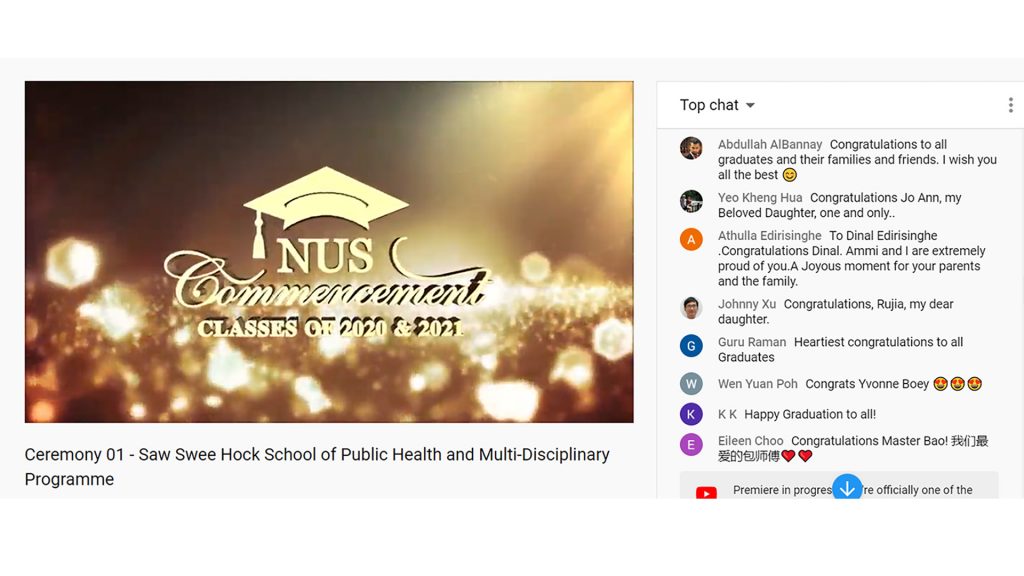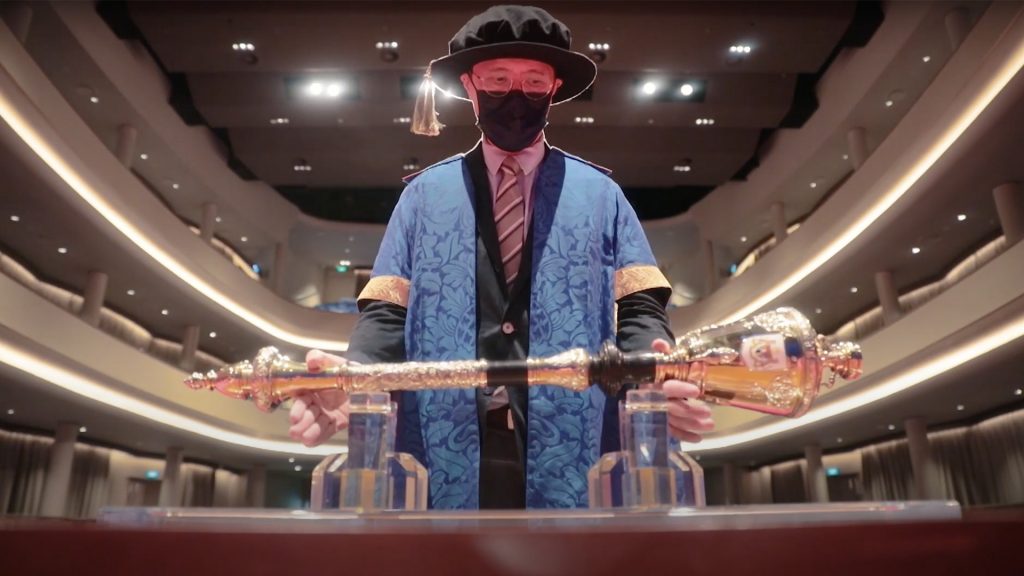Tradition Meets Modernity as NUS Celebrates the Classes of 2020 and 2021
June 26, 2021
IN BRIEF | 5 min read
-
There are 11,582 students receiving Bachelor’s and graduate degrees from the Class of 2020, and 11,990 graduates being conferred these qualifications from the Class of 2021.

The University has kick-started a week-long celebration of the achievements of more than 23,500 students from the Classes of 2020 and 2021.
It is the first time that NUS is holding its Commencement ceremonies online. And it is an ambitious undertaking, with 60 virtual ceremonies taking place from 26 Jun to 3 Jul.
There are 11,582 students receiving Bachelor’s and graduate degrees from the Class of 2020, and 11,990 graduates being conferred these qualifications from the Class of 2021.
As these students mark this milestone in their lives, they will reflect on what they have achieved while looking forward to a future of hope and promise. Beyond the trajectory of the graduates’ lives, the ceremonies bring together the past, present and future.
Technology, the way ahead
With video messages, e-cards and state-of-the-art video production, the ceremonies show the way ahead, a future where technology will increasingly define the human experience.
The present is squarely focused on the graduating students and the impact of COVID-19 on their educational journeys and their lives today.
As the valedictorians of the different cohorts recount their experiences and lessons learnt, instant messaging and social media will allow their batchmates to join in.
Even before the start of the Main Ceremony on the morning of 26 Jun, the live chat on the YouTube stream was filling up rapidly with well-wishes from the loved ones of the graduates. Technology has allowed friends and family to show support from halfway across the world, from Sri Lanka to China. “Good morning from Saudi Arabia. It is 5am here,” wrote one bleary-eyed commentator.

Keeping past traditions
No university commencement is complete without a reminder of the past, and of the event’s storied traditions that date back centuries to the earliest institutions of higher learning.
The Main Ceremony set the tone for the grandeur that can be expected at subsequent sessions. This year’s Esquire Bedell, Associate Professor Chui Wai Keung, carried the University Mace on a grand Ceremonial Procession across the University’s campuses, before the final stop at the University Cultural Centre. As rousing instrumentals played in the background, one was reminded of how much this means to everyone – not just to the graduating students, but indeed all who have gone before them and all who will come after them.


“The COVID-19 pandemic has upended our way of life and altered the face of an already disruptive future. It is a reminder that sometimes even the best laid plans can be overturned by events that are not within our control,” said Mdm Halimah.
“But we should also take this in our stride. It is during such challenging times that we must hold steadfast to our values – respect, integrity, innovation, excellence, and resilience. I encourage you to embody these traits in the path ahead.”

NUS President Professor Tan Eng Chye expressed his pride at the cohorts of 2020 and 2021 for their resolve, adaptability and unwavering commitment to excellence during this difficult period.
“Even after the pandemic has passed, the employment and economic landscape will likely look very different. To thrive in this new environment, you will need to be flexible, resilient, and constantly curious about the world.”
He encouraged the newly-minted alumni to embrace their continuing development and urged them to take advantage of the University’s Lifelong Learners programme.
The Honorary Graduate for the Class of 2020 was medical pioneer Dr Oon Chiew Seng, and the University had earlier, on 12 Jan, conferred the Honorary Doctor of Letters to her. Dr Oon is one of Singapore’s first obstetrics and gynaecology practitioners; and she has made immense contributions towards research on women's health, anti-ageing science and dementia at the NUS Yong Loo Lin School of Medicine.
Excerpts from Dr Oon’s ceremony were screened. Addressing the “Great Class of 2020”, Dr Oon shared about her life journey of overcoming adversity and seizing opportunity, and encouraged the graduates to look to the future with hope and optimism.

Each of the graduating students from SSHSPH and the Industry 4.0 programme then had their time in the spotlight. A culmination of their tireless work over the past few years, they received the acknowledgement and recognition that their efforts deserved as their names and photos flashed one-by-one on the screen.
Dr Sharon Tan was the valedictorian for the SSHSPH Class of 2020 while Dr Mervyn Lim received the honour for the 2021 Class.
In recounting the laughter and the tears, both these outstanding students reflected on the monumental roles that their batchmates will now play for the country and the world. It is a situation that none of them could have foreseen when they started their courses.
“The pandemic has cast the spotlight on public health, and you, my fellow graduates, are now full-fledged public health professionals – the unsung heroes of this pandemic,” said Dr Tan. “Our work is made possible with the great effort of our teachers in preparing us for the very real and challenging world.”
Dr Lim shared that the greatest assets from the Master of Public Health programme are the friends made, and learning how to collaborate across the multiple disciplines involved in public health.
“I believe that our Graduating Class of 2021 has a unique opportunity to break the moulds of the past and be change agents in influencing the New Normal. COVID-19 has been disruptive but more importantly it has shown how we can work together to improve our healthcare system and reduce the health inequities in Singapore.”
As the Main Ceremony concluded with more video congratulations pouring in from SSHSPH staff, it was a poignant reminder to these graduates, and those who will partake in their ceremonies in the week ahead. While physically apart, they will never be alone.
This story first appeared on NUSnews on 26 June 2021.







